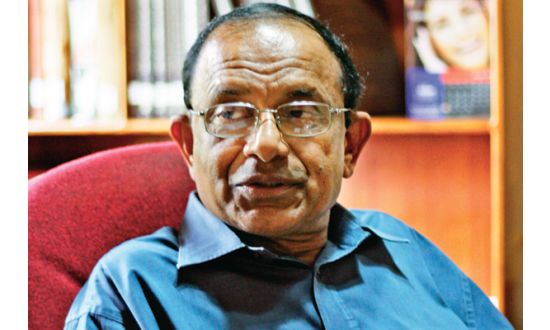Dr. Jayampathi Wickramaratne , the former MP who played a key role in drafting the 19th Amendment , said the upper limit of the term of President and Parliament as mentioned in Article 83 of the Constitution was not touched at that time only to avoid a referendum, and therefore it is regretted that President Ranil Wickremesinghe placing the blame solely on him for the constitutional error.
Issuing a statement in response to the President’s remarks, he said , “I wish to set the record straight.
Presidential candidate Maithripala Sirisena signed a memorandum of understanding with a group of 49 political parties and organisations headed by the Venerable Maduluwawe Sobitha Nayaka Thero at Viharamaha Devi Park, in which he pledged to abolish the Executive Presidency altogether. However, the very next day, he signed another MOU with the Jathika Hela Urumaya, in which he pledged not to make any constitutional change requiring a Referendum. Mr Sirisena’s election manifesto also stated that no constitutional reform necessitating a Referendum would be initiated.
Soon after being sworn in, President Sirisena appointed Mr Ranil Wickremesinghe as Prime Minister. Constitutional affairs was Gazetted as a subject under Prime Minister Wickremesinghe. A Cabinet sub-committee headed by Premier Wickremesinghe was appointed to oversee the Nineteenth Amendment process. The five-member team that prepared the initial draft comprised three retired officials who had served in very senior positions in the Legal Draftsman’s Department, myself and another lawyer. The entire drafting process was carried out on the basis that the Bill should not be placed for approval at a referendum, in keeping with President Sirisena’s electoral pledge. While the terms of the President and Parliament were proposed to be reduced from six to five years, the upper limit of six years was not touched as that would require a Referendum. Article 83 of the Constitution mandates that a Bill that seeks to amend or is inconsistent with particular Articles listed or the said upper limits would be required to be passed by a two-thirds majority in Parliament and approved by the People at a Referendum. It is essential to note that Article 83 itself is included in the list of provisions requiring a Referendum.
The several drafts prepared were all shared and discussed with the Cabinet sub-committee. The draft finally approved by the Cabinet sub-committee was then sent to the Legal Draftsman, who took over as required by law and made some changes. It was then sent to the Attorney-General, who took the view that certain clauses, especially some that reduced the powers of the President, would require a Referendum. Prime Minister Wickremesinghe had several meetings with the Attorney General to discuss the matter. I participated in one such meeting. Several changes had to be made to the Bill because of the Attorney-General’s position.
Prime Minister Wickremesinghe presented the Bill to Parliament. When it was challenged in the Supreme Court, the Attorney-General argued on behalf of the Government that no provision required a Referendum. The clauses that the Supreme Court held to require a Referendum were either amended or withdrawn in Parliament.
In light of the above, I regret that President Wickremesinghe has thought it fit to place the entire blame on me for not reducing the upper limits of the President’s and Parliament’s terms. I reiterate that the entire amendment process was based on avoiding a Referendum following President Sirisena’s pledge at the Presidential election,”


